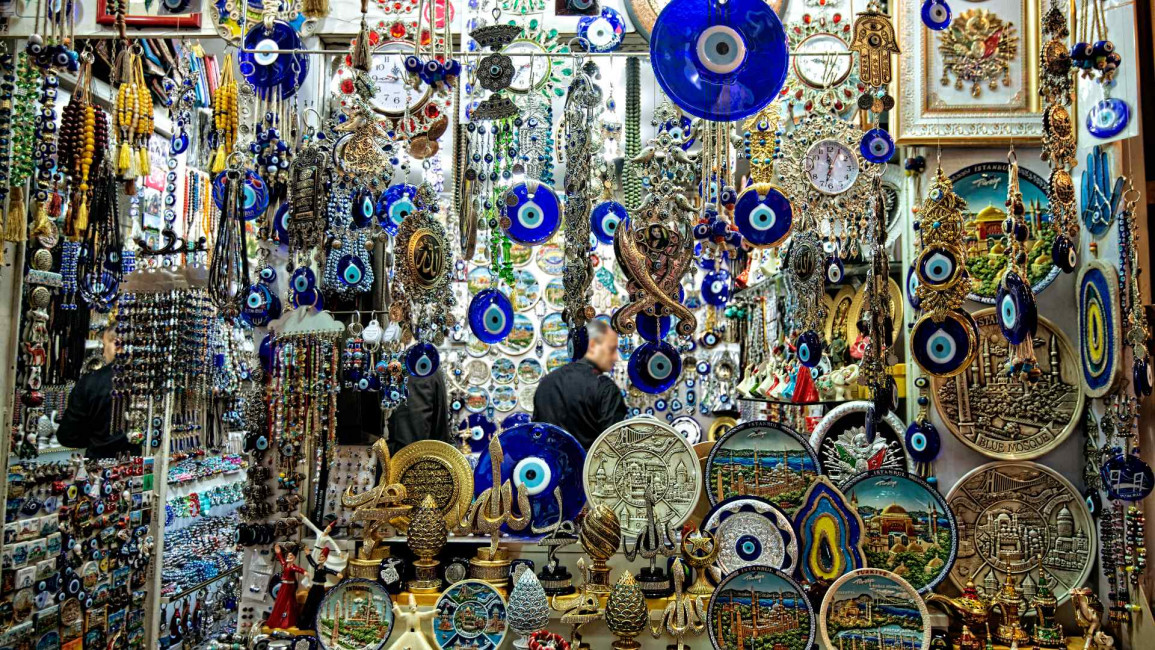Turkey's top religious authority says evil eye symbol 'impermissible' in Islam
Turkey's top religious authority says evil eye symbol 'impermissible' in Islam
The religious affairs ministry claims the use of the nazar, or evil eye symbol, is not allowed in Islam.
2 min read
Evil eye talismans are a common sight in Turkey [Getty]
Turkey's top religious authority has stirred controversy by ruling that use of the widespread evil eye symbol is prohibited in Islam.
The nazar, meant to provide protection from the evil eye, can be spotted throughout Turkey - so much so that the blue-and-white symbol has become a staple souvenir for tourists.
The Turkish religious affairs ministry issued a ruling this week against the popular symbol. The ministry, widely known as the Diyanet, regularly issues religious edicts and controls all of the country's more than 80,000 mosques.
"Islam prohibits the attitude that attributes the final effect to anyone other than Allah [God]. It is not permissible to seek help from the evil eye bead," the ruling said.
The Diyanet noted that belief in the concept of the evil eye was permitted in Islam, however.
Many cultures believe in the idea that unsuspecting persons can suffer ill from the malevolent or jealous gaze of another person. The nazar symbol is popularly used in countries from Bosnia and Bulgaria to Iran and Pakistan.
Islam's Prophet Mohammed is thought to have referenced the evil eye and belief in the concept is well-established among Muslims worldwide.
Muslims should turn to the Qur'an rather than talismanic symbols to ward off the evil eye, the Diyanet said citing the Muslim prophet's behaviour as an example.
Reciting verses from the Muslim holy book and praying for someone who has received or done something good are common Islamic methods of avoiding the evil eye.
The official message to avoid using the evil eye talisman was ridiculed by some on social media, with many pointing to how widespread the nazar's use is in Turkish culture.
"Using the evil eye symbol is a Turkish tradition. It's not within the Diyanet's purview to disallow it," said on Twitter user.
The religious affairs ministry previously attracted criticism after a 2018 ruling claimed that girls could marry as early as at nine years' old.
Follow us on Facebook, Twitter and Instagram to stay connected
The nazar, meant to provide protection from the evil eye, can be spotted throughout Turkey - so much so that the blue-and-white symbol has become a staple souvenir for tourists.
The Turkish religious affairs ministry issued a ruling this week against the popular symbol. The ministry, widely known as the Diyanet, regularly issues religious edicts and controls all of the country's more than 80,000 mosques.
"Islam prohibits the attitude that attributes the final effect to anyone other than Allah [God]. It is not permissible to seek help from the evil eye bead," the ruling said.
The Diyanet noted that belief in the concept of the evil eye was permitted in Islam, however.
Many cultures believe in the idea that unsuspecting persons can suffer ill from the malevolent or jealous gaze of another person. The nazar symbol is popularly used in countries from Bosnia and Bulgaria to Iran and Pakistan.
Islam's Prophet Mohammed is thought to have referenced the evil eye and belief in the concept is well-established among Muslims worldwide.
Muslims should turn to the Qur'an rather than talismanic symbols to ward off the evil eye, the Diyanet said citing the Muslim prophet's behaviour as an example.
Reciting verses from the Muslim holy book and praying for someone who has received or done something good are common Islamic methods of avoiding the evil eye.
The official message to avoid using the evil eye talisman was ridiculed by some on social media, with many pointing to how widespread the nazar's use is in Turkish culture.
"Using the evil eye symbol is a Turkish tradition. It's not within the Diyanet's purview to disallow it," said on Twitter user.
The religious affairs ministry previously attracted criticism after a 2018 ruling claimed that girls could marry as early as at nine years' old.
Follow us on Facebook, Twitter and Instagram to stay connected



